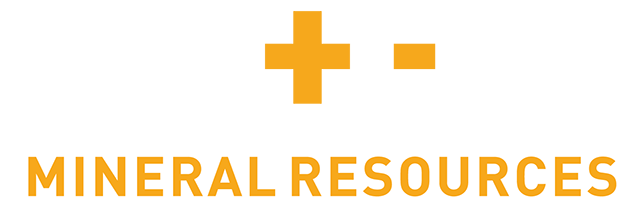Vancouver, British Columbia – (December 29, 2021) – Battery Mineral Resources Corp. (TSXV: BMR) (OTCQB: BTRMF) ("Battery" or “BMR” or the "Company") is pleased to announce encouraging drill core assay results from the on-going 2021 exploration and in-fill drill program at the Cinabrio, Dalmacia and San Andres targets within the Punitaqui mine complex (“Punitaqui”) in Chile. Punitaqui is slated for resumption of copper concentrate production in mid to late-2022.
Dalmacia is located in the southern portion of the Punitaqui area about 6 kilometers south of the Punitaqui copper processing plant. The San Andres target is located 500 meters west of the Cinabrio mine while the Cinabrio Norte and Cinabrio Sur targets represent potential extensions of the Cinabrio orebody to the north and south. (see Figure 1 and Figure 2).
Highlights
At Dalmacia, a total of 5,346 meters in 27 holes completed and drilling continues. New assay results include the following drillholes:
- DS-21-04: 6 meters (“m”) grading 0.71% Copper (“Cu”) including 4.0m at 0.87% Cu, and 13m at 0.64% Cu including 2m at 1.24% Cu;
- DS-21-05: 6m at 1.16% Cu;
- DS-21-07: 33m at 1.77% Cu, including intervals of 9.0m at 3.44% Cu, and 7.0m at 2.54% Cu, and 10m at 0.84% Cu, and 6m at 2.19% Cu.
At San Andres, the Phase 1 program resulted in the completion of 8,156m of drilling in 38 holes. All samples have been dispatched for analysis with assay results pending for the final six holes. An update of the 3D geological model is being completed which will be followed by a resource estimate by JDS Energy and Mining. New assay results include the following drillholes:
- SAS-21-27: 11m at 2.16% Cu;
- SAS-21-29: 16m at 1.49% Cu;
- SAS-21-30: 5m at 1.39% Cu including 3.0m at 1.89% Cu.
At Cinabrio Norte, nine holes have been completed for 1,443m and drilling is ongoing. This initial program is planned as 18 holes totaling 3,000m which will test 400m of strike length to a depth of 200m. Visual copper mineralization has been recorded in six of the first nine holes. Nine holes have been sampled and dispatched for analysis and results are awaited.
At Cinabrio Sur, 860m in eight holes have been completed. This drilling targeted the immediate southern extensions of the Cinabrio mine orebody just beyond the workings on the 440m level and progressively moved to the south. An additional 200m in four holes of drilling is planned as a follow-up program. Initial assay results include the following drillholes:
- CNV-21-02: 14.3m at 0.98% Cu including 10m at 1.17% Cu;
- CNV-21-03: 2.0m at 0.65% Cu;
- CNV-21-07: 6m at 1.73% Cu.
The main Cinabrio mine orebody, which historically was a source of ore feed to the Punitaqui ore concentration plant for eight-plus years, is currently being re-assessed with an update of the geological model to be followed by an update of the resource potential.
Battery CEO Martin Kostuik states; “Our recent acquisition of the former producing Punitaqui copper mine in Chile will give our investors an opportunity to participate in a potentially significant re-rating in BMR’s valuation as we transition from development to operations and positive cash-flowing.
The development of Punitaqui towards a restart is progressing well on all fronts such as drilling, engineering and permit modifications and we look forward to presenting the restart plan for the mine.
In addition, as the drilling program progresses across the various mineralized zones, we are excited about these latest assay results for Dalmacia and San Andres as well as the providing an update on the drilling at Cinabrio Norte and Cinabrio Sur.
This program has the potential to provide the Company with multiple sources of copper mineralization as ore feed for the Punitaqui processing plant. We look forward to providing further exciting updates for the drill program as we progress towards a potential near term resumption of operations and cashflow at Punitaqui”
Punitaqui Copper Mine
Punitaqui is a former producing copper mine located in the Coquimbo region of Chile with an eight-plus year operating history within which produced up to 25 million pounds of copper in concentrate annually. Punitaqui was recently acquired by BMR via a private placement equity financing announced on July 13, 2021. BMR began developing the project immediately by initiating a drilling program, operating and environmental permit modifications and engineering studies.
Dalmacia Drill Program
The Dalmacia target is located in the southern portion of the Punitaqui area about 6 kilometers south of the Punitaqui processing plant (see Figure 1). The first drilling occurred in 1993-1994 when 49 reverse circulation (“RC”) holes totaling 9,972m were completed. Historic exploration drilling at Dalmacia North has been completed at a grid spacing of 25m x 25m and 15m x 15m at Dalmacia South. Prior to the 2021 program, 229 drill holes (98 RC holes and 131 diamond core holes) have been drilled for a total of 53,294m.
The geological setting of the Dalmacia target is different from both the Cinabrio orebody and San Andres target which are located 20 kilometers to the north. Dalmacia is situated within a roof-pendant of volcanic rocks, with minor calcareous intercalations of Middle to Upper Jurassic age. This volcano-sedimentary complex is intruded by younger aged granites located in a reverse fault.
Copper-gold mineralization is related to regional structures and deformation zones, developed mainly in the contacts between granite and volcano-sedimentary rocks.
The upper portion of the Dalmacia target is accessed via a portal and a limited underground ramp and level development.
The current Phase 1 drill program is designed to infill and confirm the continuity of mineralization between previous drilling and includes a series of step-out holes to test the potential adjacent to the main zone of copper-gold-silver mineralization as defined by historic drilling.
To date, a total of 5,346 meters in 27 holes completed with an additional 500m of infill and step out drilling is planned to complete the Phase 1 program (see Figure 3).
Complete assay results were recently received for holes DS-21-04, DS-21-05 and DS-21-07.
Drillhole DS-21-04 was designed as an infill hole to test the up-dip and northern extent of the mineralization intersected in historic hole DAL-18. The new hole intersected two significant mineralized zones that included 6.0m at 0.71% Cu, 0.9g/t Ag and 0.012g/t Au from 70m downhole and 13m at 0.64% Cu and 0.9g/t Ag from 89m.
Drillhole DS-21-05 was planned as a step-out hole to test the northeastern continuation of the mineralized zone as delineated by multiple significant copper intersections immediately to the southwest. This hole intersected 3 narrow intervals of copper mineralization in ocoitas including 6m at 1.16% Cu, 1.7g/t Ag and 0.017g/t Au from 52m downhole, 1m at 1.81% Cu, 0.4g/t Ag and 0.695g/t Au from 131m and 1m at 3.22% Cu and 2.0g/t Ag from 155m as well as a quartz-pyrite vein sub-parallel to the core which returned 2m of 2.98% Cu and 3.8g/t Au from 141m.
Drillhole DS-21-07 was drilled to follow-up near surface copper mineralization intersected in historic hole DS-1113 (22.9m at 1.14% Cu). This infill drillhole intersected 33m at 1.77% Cu, 1.5g/t Ag and 0.052g/t Au from 24m including two higher-grade intervals: 9.0m at 3.44% Cu, 1.6g/t Ag and 0.167g/t Au from 24m and 7.0m at 2.54% Cu, 3.5g/t Ag and 0.020g/t Au from 39m. This upper mineralized intercept was dominantly copper oxides. Deeper sulphide intersections included 10m at 0.84% Cu, 1.2g/t Ag and 0.032g/t Au from 84m and 6m at 2.19% Cu, and 0.4g/t Ag from 176m. Additional assays are pending.
The infill drilling results to date have defined several steep dipping shoots of high-grade mineralization. Step-out drilling has identified high-grade mineralization beyond the northern edge of the main drilling grid.
Significant 2021 assay results received to date for the Dalmacia 2021 drilling program include the following drillholes (see Table 1):
- DS-21-01 (Infill): 23m at 1.16% Cu, including 13m at 1.56% Cu;
- DS-21-02 (Infill): 11m at 1.08% Cu, including 4m at 2.32% Cu;
- DS-21-03 (Infill): 15m at 1.01% Cu, including 4m at 2.47% Cu;
- DS-21-04 (Infill): 13m at 0.64% Cu including 2m at 1.24% Cu;
- DS-21-05 (Step-out): 6m at 1.16% Cu;
- DS-21-O6 (Step-out): 32m grading 0.73% Cu including 16m at 1.15% Cu and 95m at 0.78% Cu including 29m at 1.45% Cu, including a higher-grade interval of 14m at 2.44% Cu;
- DS-21-07 (Infill): 33m at 1.77% Cu, including intervals of 9.0m at 3.44% Cu, and 7.0m at 2.54% Cu, and 10m at 0.84% Cu, and 6m at 2.19% Cu.
Table 1: 2021 BMR Drilling Dalmacia Target Significant Drill Assay Intervals
| Drillhole Number |
From (m) |
To (m) |
Sample Interval (m) |
Copper Cu (%) |
Silver Ag (g/t) |
Gold Au (g/t) |
|---|---|---|---|---|---|---|
| DS-21-01 | 79 | 91 | 12 | 1.79 | 2.5 | 0.028 |
| including | 80 | 88 | 8 | 2.44 | 3.2 | 0.035 |
| and | 105 | 128 | 23 | 1.16 | 1.7 | 0.016 |
| including | 115 | 128 | 13 | 1.56 | 2.1 | 0.024 |
| including | 115 | 122 | 7 | 2.32 | 3.1 | 0.036 |
| and | 137 | 139 | 2 | 1.06 | 0.7 | 0.030 |
| and | 180 | 184 | 4 | 0.89 | 0.4 | - |
| and | 220 | 224.9 | 4.9 | 0.72 | 0.6 | - |
| DS-21-02 | 22 | 29 | 7 | 1.67 | 2.6 | 0.08 |
| and | 64 | 74 | 10 | 1.03 | 2.1 | - |
| including | 64 | 67 | 3 | 1.49 | 2.3 | - |
| and | 71 | 73 | 2 | 2.34 | 5.0 | - |
| and | 99 | 106 | 7 | 2.58 | 2.7 | - |
| and | 177 | 188 | 11 | 1.08 | 0.9 | 0.08 |
| including | 177 | 181 | 4 | 2.32 | 1.4 | 0.17 |
| including | 177 | 180 | 3 | 2.90 | 1.7 | 0.22 |
| DS-21-03 | 46 | 61 | 15 | 1.01 | 1.2 | 0.017 |
| including | 46 | 50 | 4 | 2.47 | 3.1 | 0.05 |
| DS-21-04 | 70 | 76 | 6 | 0.71 | 0.9 | 0.012 |
| Including | 72 | 76 | 4 | 0.87 | 1.0 | 0.010 |
| and | 89 | 102 | 13 | 0.64 | 0.9 | - |
| including | 93 | 95 | 2 | 1.24 | 1.5 | - |
| DS-21-05 | 52 | 58 | 6 | 1.16 | 1.7 | 0.017 |
| 131 | 132 | 1 | 1.81 | 0.4 | 0.695 | |
| 141 | 143 | 2 | 2.98 | 5.0 | 3.835 | |
| 155 | 156 | 1 | 3.22 | 2.0 | - | |
| DS-21-06 | 37 | 69 | 32 | 0.73 | 0.5 | - |
| including | 37 | 53 | 16 | 1.15 | 0.6 | 0.060 |
| including | 37 | 44 | 7 | 1.75 | 0.8 | 0.079 |
| and | 112 | 115 | 3 | 2.14 | 0.6 | 0.030 |
| and | 134 | 139 | 5 | 1.58 | 0.4 | 0.019 |
| and | 167 | 262 | 95 | 0.78 | 0.5 | - |
| including | 167 | 170 | 3 | 1.84 | 0.8 | 0.096 |
| and | 183 | 187 | 4 | 1.75 | 0.6 | 0.071 |
| and | 19 | 262 | 65 | 0.93 | 0.5 | - |
| including | 197 | 211 | 14 | 2.44 | 0.7 | 0.039 |
| and | 243 | 262 | 19 | 1.10 | 0.6 | 0.022 |
| including | 243 | 251 | 8 | 1.88 | 0.7 | 0.029 |
| and | 260 | 262 | 2 | 1.79 | 0.7 | 0.060 |
| DS-21-07 | 24 | 57 | 33 | 1.77 | 1.5 | 0.052 |
| including | 24 | 33 | 9 | 3.44 | 1.6 | 0.167 |
| and | 39 | 46 | 7 | 2.54 | 3.5 | 0.020 |
| and | 84 | 94 | 10 | 0.84 | 1.2 | 0.032 |
| and | 176 | 182 | 6 | 2.19 | 0.4 | - |
Note: All intervals are downhole core lengths
San Andres Drill Program
San Andres is a zone of copper mineralization located 500m southwest of the high-grade Cinabrio deposit mined by Glencore and Xiana Mining (see Figure 1).
The San Andres target is a tabular sedimentary horizon within a volcanic sequence. This sedimentary horizon (“TSU”) is variably mineralized and has a variable width ranging from 5m - 30m. It consists of an interlayered volcano-sedimentary sequence composed of dark colored laminated and unlaminated shales, volcanoclastic sandstone, conglomerates and breccias and tuff breccias. There is a variable component of syngenetic pyrite. The horizon dips 40 to 50 degrees to the east and is cut-off at depth by the moderately west dipping San Andres fault (see Figure 3).
Mineralization consists of veinlets and irregular disseminations in both the fine and coarse-grained clastic rocks and locally within the volcanic rocks above and below the host unit. The TSU is also cut and offset by other faults with a wide range of orientations. The fundamental orientations identified to date include:
- moderately west dipping splays of the San Andres fault, generally with downward and westward movement
- steep dipping northeast to northwest trending faults with both sinistral and dextral offsets
- Faults parallel and sub-parallel to stratigraphy
At San Andres, the phase 1 drilling has been completed resulting in 8,156m of drilling in 38 holes. All samples have been dispatched for analysis with assay results pending for the final 6 holes. The phase 1 program targeted a 600m north-south trending zone and this drilling has delineated a 400m long zone of significant copper mineralization above the San Andres Fault. The TSU favorable stratigraphic package that hosts the San Andres mineralization continues along strike to the north and south.
Work is currently focused on updating of the 3D geological model which will be followed by a resource modelling and estimation by JDS Energy and Mining Inc.
New assays for 3 holes (SAS-21-27, 29 & 30) have been received. SAS-21-27 & 29 were vertical step-out holes drilled in the south-central part of the San Andres Target (see Figure 4).
Drillhole SAS-21-27 was designed as a 60m down-dip test of sulphide mineralization intersected in SAS-21-12 (18m at 1.18% Cu). The new hole SAS-21-27 cut a downhole interval of 11m at 2.16% Cu, 14.9g/t Ag and 0.01g/t Au from 213m.
Drillhole SAS-21-29 targeted as a 60m down-dip step-out of the mineralization intersected in hole SAS-21-14 (12.8m at 1.44% Cu). The new hole SASA-21-29 cut a downhole interval of 16m at 1.49% Cu, 5.7g/t Ag and 0.008g/t Au from 218m.
Drillhole SAS-21-30 was drilled on the north end of San Andres Zones as a 50m up-dip step-out test of mineralized intercept in SAS-21-19 (4m at 1.24% Cu) and yielded a downhole intercept of 5m at 1.39% Cu, 5.2g/t Ag and 0.006g/t Au from 50m including: 3.0m at 1.89% Cu, 7.7g/t Ag and 0.009g/t Au from 52m
In addition, significant 2021 assay results received to date for the Phase 1 San Andres Drilling are included in Table 2.
Table 2: San Andres Target 2021 Drilling Significant Drill Assay Intervals
| Drillhole Number |
From (m) |
To (m) |
Sample Interval (m) |
Copper Cu (%) |
Silver Ag (g/t) |
Gold Au (g/t) |
|---|---|---|---|---|---|---|
| SAS-21-01 | 180.2 | 183.2 | 3.0 | 1.52 | 2.00 | 0.007 |
| SAS-21-02 | 185 | 188 | 3 | 0.04 | - | - |
| SAS-21-03 including |
195 | 209 | 14 | 1.18 | 3.30 | 0.047 |
| 201 | 209 | 8 | 1.62 | 4.60 | 0.064 | |
| SAS-21-04 including and including |
185.0 | 201.7 | 16.7 | 1.37 | 3.50 | 0.106 |
| 190.0 | 201.7 | 11.7 | 1.64 | 4.60 | 0.148 | |
| 220.7 | 232.0 | 11.3 | 1.48 | 6.20 | 0.005 | |
| 223 | 232 | 9 | 1.76 | 7.50 | 0.005 | |
| SAS-21-05 including |
202 | 229 | 27 | 0.89 | 10.50 | 0.001 |
| 220 | 229 | 9 | 2.06 | 20.50 | 0.001 | |
| SAS-21-07 including and |
241.0 | 263.7 | 22.3 | 0.71 | 1.30 | 0.008 |
| 244.7 | 249.0 | 4.4 | 1.93 | 3.40 | 0.003 | |
| 257 | 261 | 4 | 1.57 | 2.10 | 0.014 | |
| SAS-21-08 including and |
221.75 | 236.55 | 14.80 | 0.95 | 1.90 | 0.012 |
| 221.75 | 227.00 | 5.25 | 1.39 | 2.50 | 0.024 | |
| 232.9 | 236.7 | 3.8 | 1.84 | 3.90 | 0.002 | |
| SAS -21-11 | 53 | 55 | 2 | 0.91 | 11.10 | 0.001 |
| SAS-21-12 | 162 | 164 | 2 | 1.04 | 5.00 | 0.004 |
| including | 176 | 194 | 18 | 1.18 | 2.50 | 0.001 |
| including | 176 | 183 | 7 | 1.81 | 2.60 | 0.001 |
| SAS-21-13 | 199 | 202 | 3 | 0.87 | 19.90 | 0.001 |
| including | 211.0 | 212.8 | 1.8 | 0.83 | 16.70 | 0.001 |
| including | 217 | 221 | 4 | 1.59 | 19.20 | 0.001 |
| SAS-21-14 | 203.2 | 239.0 | 35.8 | 0.98 | 3.30 | 0.007 |
| including | 203.2 | 216.0 | 12.8 | 1.44 | 5.00 | 0.002 |
| including | 207 | 216 | 9 | 1.83 | 5.90 | - |
| including | 227 | 239 | 12 | 1.25 | 3.6 | 0.018 |
| SAS-21-15 | 116 | 119 | 3 | 0.50 | 8.30 | - |
| and | 133 | 136 | 3 | 0.48 | 6.00 | - |
| and | 139 | 141 | 3 | 0.51 | 0.40 | - |
| SAS-21-17 | 241.4 | 245.0 | 3.6 | 1.04 | 1.00 | - |
| SAS-21-19 | 74 | 78 | 4 | 1.24 | 2.20 | 0.001 |
| SAS-21-20 | 266.9 | 269.3 | 2.4 | 0.70 | 0.10 | - |
| SAS-21-21 | 106 | 131 | 25 | 0.88 | 14.90 | 0.001 |
| including | 106 | 119 | 13 | 0.96 | 21.80 | - |
| including | 115 | 119 | 4 | 1.19 | 20.10 | 0.001 |
| and | 136 | 138 | 2 | 1.12 | 18.20 | - |
| SAS-21-23 | 194.0 | 196.8 | 2.8 | 1.00 | 8.70 | 0.032 |
| including | 196.0 | 196.8 | 0.8 | 2.12 | 8.00 | 0.037 |
| SAS-21-24 | 231 | 234 | 3 | 0.82 | 1.70 | - |
| SAS-21-27 | 213 | 224 | 11 | 2.16 | 14.9 | 0.008 |
| SAS-21-29 | 218 | 234 | 16 | 1.49 | 5.70 | 0.004 |
| SAS-21-30 | 50 | 55 | 5 | 1.39 | 5.20 | 0.006 |
| including | 52 | 55 | 3 | 1.89 | 7.70 | 0.009 |
All intervals are downhole core lengths
Cinabrio Norte Drill Program
At Cinabrio Norte, a phase 1 drill test will follow-up on a limited number of historic drillholes that targeted the northern extension of the Cinabrio orebody.
The historic exploration drilling confirmed that the favorable targeted stratigraphic unit (“TSU”) that hosts the copper mineralization within the Cinabrio orebody extends to the north. The TSU has been mapped along a north-south strike from the mine. The Cinabrio Norte target is only 110m north of the Cinabrio underground workings level 200m (see Figure 5, Figure 6 and Table 3). Historic hole CNS-20-01 drilled by Xiana Mining was drilled completely within the TSU resulting in multiple mineralized intercepts and, most importantly, confirmed the presence of TSU for over 200m of strike length with significant copper sulphide mineralization.
Table 3: Cinabrio Norte Historic Exploration Drill Intercepts
| Drillhole Number |
From (m) |
To (m) |
Sample Interval (m) |
Copper Cu (%) |
Silver Ag (g/t) |
Gold Au (g/t) |
|---|---|---|---|---|---|---|
| CNB-01 | 29 | 31 | 2 | 0.43 | - | 0.015 |
| and | 39 | 43 | 4 | 0.48 | - | 0.013 |
| CNN-R-08-09 | 136 | 141 | 5 | 1.49 | 3.85 | - |
| CNO-08-03 | 280 | 285 | 5 | 0.33 | - | - |
| CNO-08-09 | 289 | 291 | 2 | 1.05 | - | - |
| CNO-08-10 | 238 | 240 | 2 | 0.43 | 5.0 | - |
| CNO-08-12 | 209 | 215 | 6 | 1.14 | - | - |
| CNS-20-01 | 205 | 253 | 48 | 0.64 | - | - |
| and | 271 | 274 | 3 | 0.47 | - | - |
| and | 287 | 293 | 6 | 0.45 | - | - |
| CNS-20-02 | 82 | 85 | 3 | 0.91 | - | - |
| CNS-20-03 | 95.2 | 96.2 | 1.0 | 0.34 | - | - |
| CNS-20-04 | 94 | 108 | 14 | 0.75 | - | - |
| CS-0-15-06 | 93.23 | 94.23 | 1.00 | 2.74 | 16.4 | 0.010 |
| PZ-01 | 20 | 29 | 9 | 0.87 | 3.0 | 0.020 |
| and | 32 | 34 | 2 | 0.60 | - | - |
| and | 37 | 43 | 6 | 0.58 | 1.0 | 0.020 |
Note: All intervals are downhole lengths
This initial program is planned as 18 holes totaling 3,000m which will test 400m of strike length to a depth of 200m. Drilling commenced mid-November with one drill and in early December a second drill was added. To date, nine holes have been completed for 1,443m and drilling is ongoing.
Six of the nine holes intersected sections of strongly mineralized sedimentary rocks with sulphide copper mineralization observed. Assays are pending.
Drillhole CNN-21-02 intersected 22 meters of the target sedimentary horizon composed of interlayered pyritic shales and tuffaceous sandstones. Weak to moderate chalcopyrite mineralization occurs in the upper part of this sedimentary horizon. Bornite-chalcopyrite mineralization was noted in a five-meter wide shaley unit at the base of the sedimentary unit. Drillholes CNN-21-01 and CNN-21-04 also intersected bornite-rich intervals. Drill hole CNN-21-05 intersected pyritic shales with weak copper mineralization.
Cinabrio Sur Drill Program
At Cinabrio Sur, a limited Phase 1 drill program was recently completed to test the Cinabrio mine mineralization to the south.
The target at Cinabrio Sur is the southern extension of TSU hosting the Cinabrio orebody. The lack of surface exposures of the TSU is interpreted to be explained by the moderately west dipping San Andres fault cutting the upward projection of this unit before it reached surface. This interpretation infers that the TSU is present at depth but is not exposed at surface south of the Cinabrio mine deposit (see Table 4, Figure 7 and Figure 8).
This drilling targeted the immediate southern extensions of the Cinabrio orebody just beyond the workings on the 440m level in an earlier where a series of historic reverse circulation holes had confirmed the presence of the TSU and copper mineralization.
In addition, four wide-spaced step-out holes to the south. A total of 860m in eight diamond core holes have been completed with assay results for three drillholes received and are shown in Table 4. An additional four short infill holes are planned as a follow-up program targeting the immediate southern extension of the existing mine workings.
Table 4: Cinabrio Sur Target 2021 Drilling Significant Drill Assay Intervals
| Drillhole Number |
From (m) |
To (m) |
Sample Interval (m) |
Copper Cu (%) |
Silver Ag (g/t) |
Gold Au (g/t) |
|---|---|---|---|---|---|---|
| CNV-21-02 | 50.8 | 65.0 | 14.3 | 0.98 | 0.5 | - |
| including | 55 | 65 | 10 | 1.17 | 0.5 | 0.014 |
| CNV-21-03 | 61 | 63 | 2 | 0.65 | 0.8 | 0.051 |
| CNV-21-07 | 37 | 43 | 6 | 1.73 | 0.5 | - |
Note: All intervals are downhole core lengths
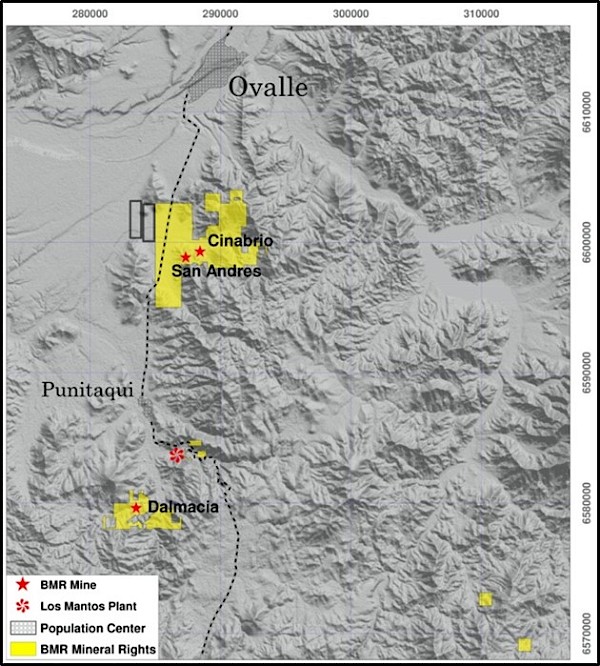
Figure 1: Punitaqui Drill Target Location Map
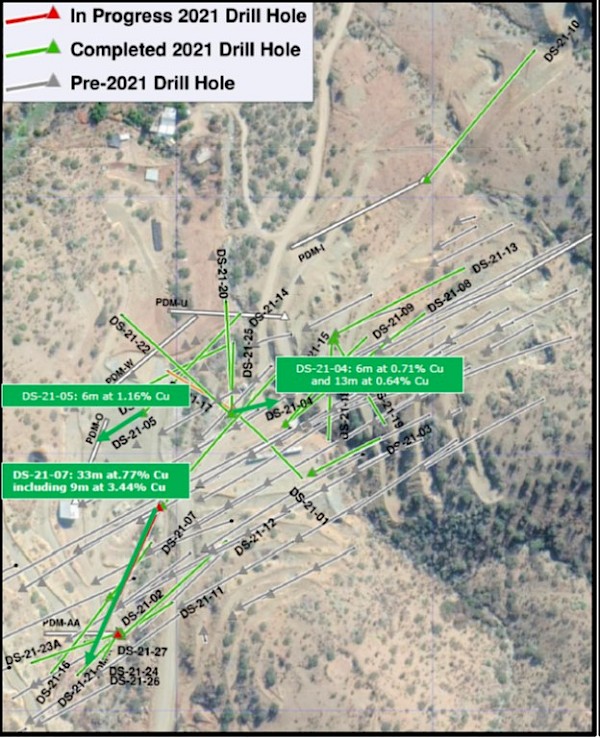
Figure 2: Dalmacia Target Drill Collar Plan with Recent Copper Intercepts
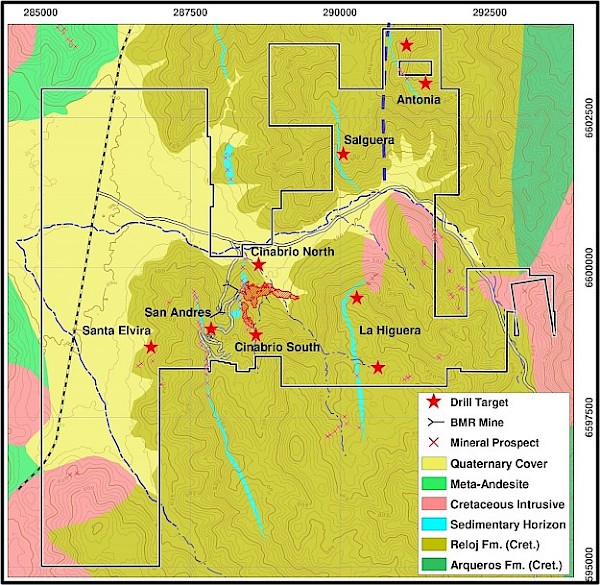
Figure 3: Cinabrio – San Andres Geology and Targets Plan
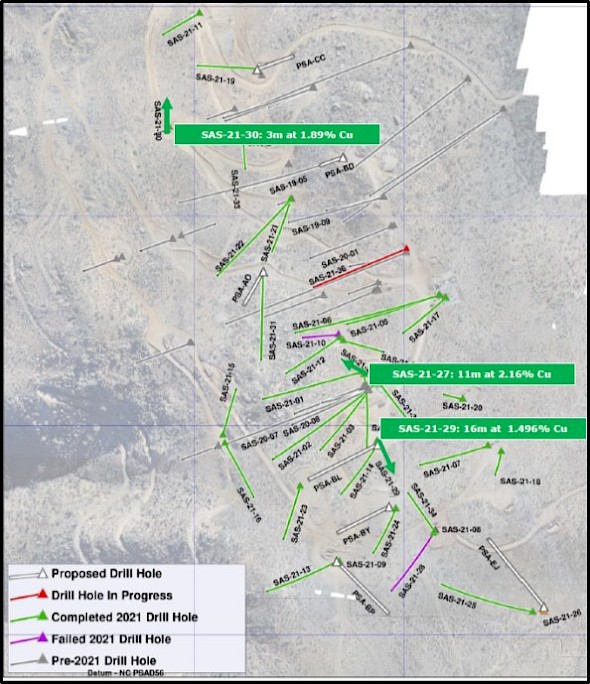
Figure 4: San Andres Drill Collar Plan with Recent Copper Intercepts
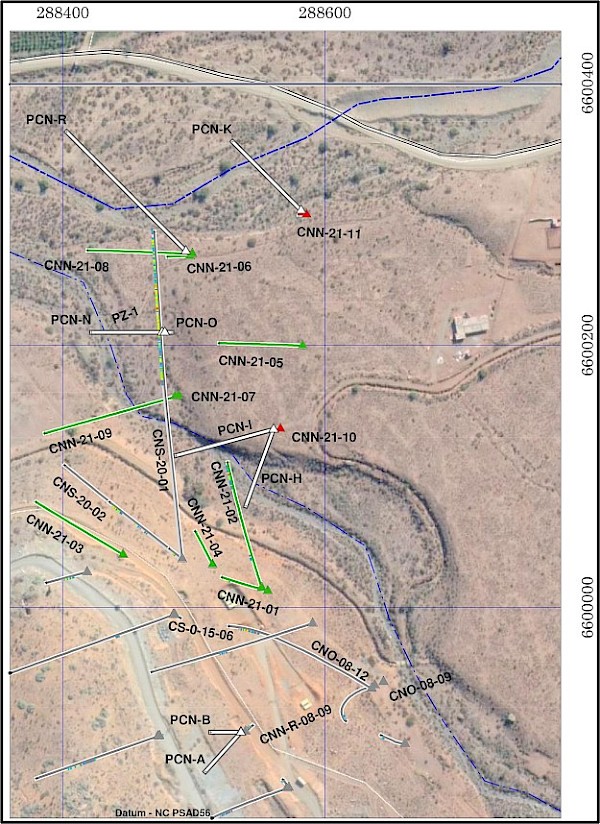
Figure 5: Cinabrio Norte Drill Collar Plan (2021 completed holes in green and historic holes in grey)
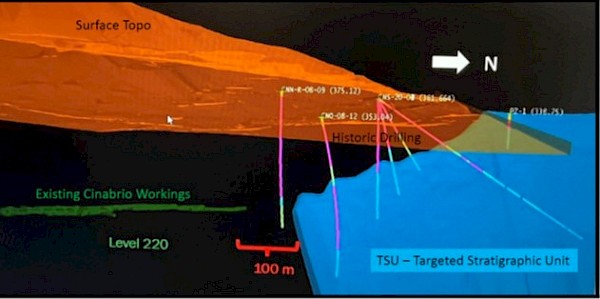
Figure 6: Cinabrio Norte Target Schematic 3D View Looking East
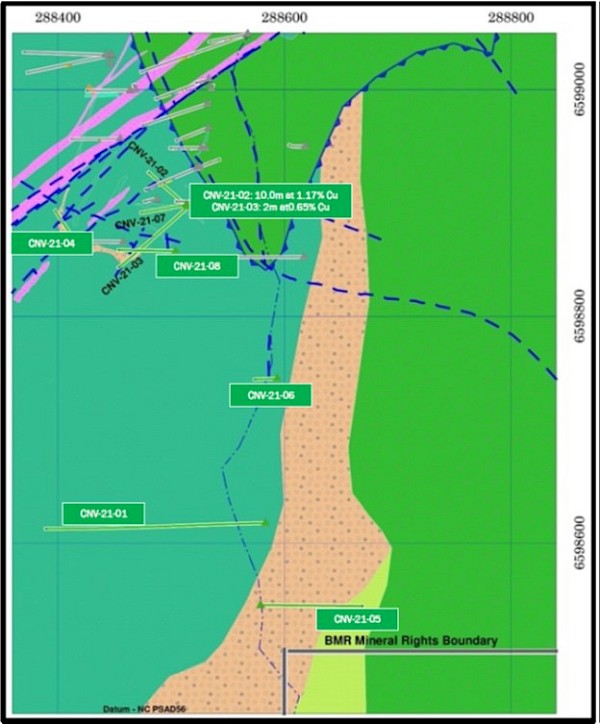
Figure 7: Cinabrio South Geology and Drill Collar Plan (2021 completed holes in green and historic holes in grey)
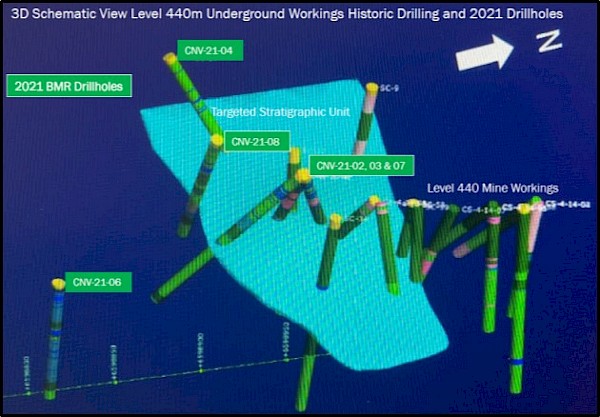
Figure 8: Cinabrio South Target 3D Schematic View Level 440m Workings & Drilling
Quality Control
Sample preparation, analysis and security procedures applied on the BMR exploration projects is aligned with industry best practice. BMR has implemented protocols and procedures to ensure high quality collection and management of samples resulting in reliable exploration assay data. BMR has implemented formal analytical quality control monitoring for all field sampling and drilling programs by inserting blanks and certified reference materials into every sample sequence dispatched.
Sample preparation is performed ALS Global - Geochemistry Analytical Lab in La Serena, Chile and sample analyses by ALS in Lima, Peru. ALS analytical facilities are commercial laboratories and are independent from BMR. All BMR samples are collected and packaged by BMR staff and delivered upon receipt at the ALS Laboratory. Samples are logged in a sophisticated laboratory information management system for sample tracking, scheduling, quality control, and electronic reporting. Samples are dried then crushed to 70% < -2 millimeters and a riffle split of 250 grams is then pulverized to 85% of the material achieving a size of <75 microns. These prepared samples are then shipped to the ALS Laboratory in Lima Peru for analyses by the following methods:
- ME-MS61: A high precision, multi-acid digest including Hydrofluoric, Nitric, Perchloric and Hydrochloric acids. Analysed by inductively coupled plasma (“ICP”) mass spectrometry that produces results for 48 elements.
- ME-OG62: Aqua-Regia digest: Analysed by ICP-AES (Atomic Emission Spectrometry) or sometimes called optical emission spectrometry (ICP-OES) for high levels of Co, Cu, Ni and Ag.
Certified standards are inserted into sample batches by ALS. Blanks and duplicates are inserted within each analytical run. The blank is inserted at the beginning, certified standards are inserted at random intervals, and duplicates are analysed at the end of the batch.
Additional Information
Michael Schuler, Battery Mineral Resources Corp. Chile Exploration Manager, supervised the preparation of and approved the scientific and technical information in this press release pertaining to the Punitaqui Exploration Drill Program. Mr. Schuler is a qualified person as defined by National Instrument 43-101 - Standards of Disclosure for Mineral Projects.
About Battery Mineral Resources Corp.
A battery mineral company with high-quality assets providing shareholders exposure to the global mega-trend of electrification and focused on growth through cash-flow, exploration and acquisitions in the world's top mining jurisdictions. Battery is currently developing the Punitaqui Mining Complex and pursuing the potential near term resumption of operations for second half of 2022 at the prior producing Punitaqui copper-gold mine. The Punitaqui copper-gold mine most recently produced approximately 21,000 tonnes of copper concentrate in 2019 and is located in the Coquimbo region of Chile.
Battery is engaged in the discovery, acquisition, and development of battery metals (cobalt, lithium, graphite, nickel and copper), in North and South America and South Korea with the intention of becoming a premier and sustainable supplier of battery minerals to the electrification marketplace. Battery is the largest mineral claim holder in the historic Gowganda Cobalt-Silver Camp, Canada and continues to pursue a focused program to build on the recently announced, +1-million-pound high grade cobalt resource at McAra by testing over 50 high-grade primary cobalt silver-nickel-copper targets. In addition, Battery owns 100% of ESI Energy Services, Inc., also known as Ozzie's, a pipeline equipment rental and sales company with operations in Leduc, Alberta and Phoenix, Arizona.
For further information, please contact:
Battery Mineral Resources Corp.
Martin Kostuik
Phone: +1 (604) 229 3830
Email: info@bmrcorp.com
Neither the TSXV nor its Regulation Services Provider (as that term is defined in the policies of the TSXV) accepts responsibility for the adequacy or accuracy of this press release.
Forward Looking Statements
This news release includes certain “forward-looking statements” under applicable Canadian securities legislation. There can be no assurance that such statements will prove to be accurate, and actual results and future events could differ materially from those anticipated in such statements. Forward-looking statements reflect the beliefs, opinions and projections of the Company on the date the statements are made and are based upon a number of assumptions and estimates that, while considered reasonable by the Company, are inherently subject to significant business, economic, competitive, political and social uncertainties and contingencies. Many factors, both known and unknown, could cause actual results, performance, or achievements to be materially different from the results, performance or achievements that are or may be expressed or implied by such forward-looking statements and the parties have made assumptions and estimates based on or related to many of these factors. Such factors include, without limitation, the ability of the Company to obtain sufficient financing to complete exploration and development activities, risks related to share price and market conditions, the inherent risks involved in the mining, exploration and development of mineral properties, government regulation and fluctuating metal prices. Accordingly, readers should not place undue reliance on forward-looking statements. Battery undertakes no obligation to update publicly or otherwise revise any forward-looking statements contained herein, whether as a result of new information or future events or otherwise, except as may be required by law.
